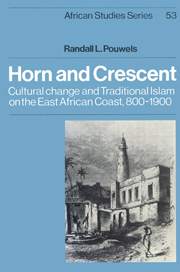Book contents
- Frontmatter
- Contents
- List of illustrations and maps
- Preface
- List of abbreviations
- Introduction
- 1 The roots of a tradition, 800–1500
- 2 The emergence of a tradition, 900–1500
- 3 A northern metamorphosis, 1500–1800
- 4 Town Islam and the umma ideal
- 5 Wealth, piety, justice, and learning
- 6 The Zanzibar Sultanate, 1812–88
- 7 New secularism and bureaucratic centralization
- 8 A new literacy
- 9 The early colonial era, 1885–1914
- 10 Currents of popularism and eddies of reform
- Notes
- Glossary
- Bibliography
- Index
7 - New secularism and bureaucratic centralization
Published online by Cambridge University Press: 23 September 2009
- Frontmatter
- Contents
- List of illustrations and maps
- Preface
- List of abbreviations
- Introduction
- 1 The roots of a tradition, 800–1500
- 2 The emergence of a tradition, 900–1500
- 3 A northern metamorphosis, 1500–1800
- 4 Town Islam and the umma ideal
- 5 Wealth, piety, justice, and learning
- 6 The Zanzibar Sultanate, 1812–88
- 7 New secularism and bureaucratic centralization
- 8 A new literacy
- 9 The early colonial era, 1885–1914
- 10 Currents of popularism and eddies of reform
- Notes
- Glossary
- Bibliography
- Index
Summary
The coming of the Busaidi Sultanate marked a new departure for townspeople from purely local concerns and views to a new internationalism. Certainly this was true in the realm of economics for most towns, and was true of Lamu before the 1820s. Yet, what started in coastal economy slowly worked its way into the social and ideological spheres. Local reactions to these alterations, as should have been apparent in the preceding chapter, were ambivalent, even contradictory. While some chose to embrace the new order of things from the start, others were slow to reconcile themselves to the changes. And while a new social condition was of obvious benefit to newcomers and outsiders in the towns, as Mannheim explains matters, the old elite found accommodating themselves a more difficult matter.
Although changes were being introduced from the time of Sayyid Said onwards, matters advanced by several quantum steps in the reign of Sayyid Barghash. While Said b. Sultan simply introduced the prevailing political and economic order of Muscat to his new capital at Zanzibar, Sayyid Barghash conscientiously and actively sought changes in the ideological realm. It is for this reason that he is remembered on the coast as the first modernizer in coastal history, and it is to his reign and those of his successors that the subject matter of this chapter is especially applicable.
- Type
- Chapter
- Information
- Horn and CrescentCultural Change and Traditional Islam on the East African Coast, 800–1900, pp. 125 - 144Publisher: Cambridge University PressPrint publication year: 1987



